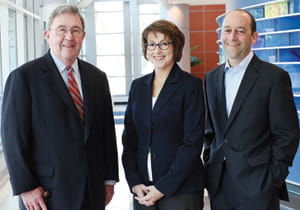Helping children live better and longer
This year’s research annual report showcases some of the breakthrough findings that have placed us among the nation’s leaders in pediatric medicine. In this report, we focus on our research in areas of childhood illness that have troubled doctors for generations.
 |
(Above, from left) Thomas Cody, Chairman, Board of Trustees; Nancy Eddy, PhD, Research Chair; Michael Fisher, President & CEO of Cincinnati Children’s |
What happens when a child’s organs stop working? Here, you will read about the latest science in organ transplantation — crucial discoveries that have led to changes in what we do before, during and after transplant. These advanced approaches are helping children live better and longer. But there is much more to be done, and you will also learn where transplantation is heading.
In the battle against sickle cell disease, years of research and preparation have put us on the threshold of testing a potential cure.
We report on a drug for cystic fibrosis that researchers believe will allow some patients to live into later adulthood and beyond — and how our exploration of its use with other drugs might offer the same chance to many more.
Our cancer researchers have discovered a way to reverse the aging of bone marrow stem cells, with exciting potential for slowing the aging process and treating cancers. In another study, researchers discovered a compound that regulates the body’s inflammatory process and appears to stop the growth of cancer.
Working for and with a medical center that cares for some of the sickest children is a privilege as well as an awesome responsibility. It is heightened by the awareness that our research has helped change the course not only for children in our care, but for countless children around the world. |
And there is more, all of it equally compelling. What makes these stories even more remarkable is that every breakthrough described here started as an idea, a researcher asking, “why?”
Moving from that moment of “why” to the “aha” of a breakthrough is the hard work of research. It takes time — years of testing, failing, revising, and continuing forward. It takes long hours of methodical and exacting effort. And it takes support — support for the skilled staff, the right tools, the right environment, and the time — to make the exploration possible.
Ensuring the support for our research endeavors is paramount. We do it by providing funding through our endowment, our clinical endeavors, philanthropy, business partnerships and other revenue sources. We do it by building state-of-the-art facilities such as our new clinical sciences building, now underway. And we do it by recognizing the integral role played by our outstanding basic and clinical researchers.
Their science is the fuel for our clinical achievements. Without it, medicine would stagnate. Breakthrough treatments would cease. And children would continue to suffer and die.
The work featured here — just a sampling of our overall research — is evidence of that. We invite you to read on, and see for yourself.



